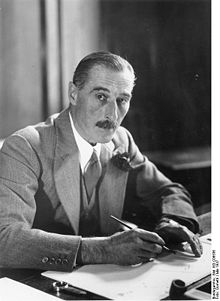- Nevile Henderson
-
Sir Nevile Meyrick Henderson, KCMG (10 June 1882 – 30 December 1942), was the third child of Robert and Emma Henderson and was born at Sedgwick Park near Horsham, West Sussex. [1] Ambassador of Great Britain to Germany from 1937 to 1939, he believed that Adolf Hitler could be controlled and pushed toward peace and cooperation with the Western powers. In February 1939, he cabled the Foreign Office in London: "If we handle him (Hitler) right, my belief is that he will become gradually more pacific. But if we treat him as a pariah or mad dog we shall turn him finally and irrevocably into one."
Henderson was ambassador at the time of the Munich Agreement, and counselled Neville Chamberlain to enter into it. Shortly thereafter, he returned to London for medical treatment, returning to Berlin in ill-health in February 1939 (he would die of cancer less than four years later).[2]
During the course of 1939, Henderson came into frequent conflict with Alexander Cadogan, Permanent Undersecretary of the Foreign Office. Henderson argued that Britain should go about rearmament in secret, as a public rearmament would encourage the belief that Britain planned to go to war with Germany. Cadogan and the Foreign Office disagreed.
On the night of August 30, 1939, Henderson had an extremely tense meeting with the [German Foreign Minister] Joachim von Ribbentrop. Ribbentrop presented the German "final offer" at midnight, and warned Henderson that he received no reply as the dawn, the "final offer" would be considered rejected. "When Ribbentrop refused to give a copy of the German demands to the British Ambassador at midnight of 30 August-31 August 1939, the two almost came to blows. Ambassador Henderson, who had long advocated concessions to Germany, recognized that here was a deliberately conceived alibi the German government had prepared for a war it was determined to start. No wonder Henderson was angry; von Ribbentrop on the other hand could see war ahead and went home beaming."[3]
While advising accommodation over Germany's territorial ambitions in Poland - as he had in Czechoslovakia and Austria - it was Henderson who delivered the ultimatum on the morning of 3 September 1939 to Hitler stating that if hostilities between Germany and Poland did not cease by 11 a.m. that day, a state of war would exist. Germany did not respond, and Prime Minister Neville Chamberlain declared war at 11:15 a.m.
After returning to London, Henderson wrote a book, Failure of a Mission: Berlin 1937-1939, published in 1940. In it, he spoke highly of some members of the Nazi regime, including Hermann Göring. In contrast, he was not complimentary about Joachim von Ribbentrop.
Before his term in Germany, Henderson served as Envoy Extraordinary and Minister Plenipotentiary to the Kingdom of Yugoslavia between 1929 and 1935,[4] where he was in close confidence to King Alexander and Prince Paul. Henderson was on friendly terms with the members of the Astors' Cliveden set, which also supported the appeasement of Hitler, and whose member was Prince Paul of Yugoslavia. Henderson wrote in his memoirs how eager Alexander was to show him his military plans to counter the Mussolini's projected attack on Dalmatia, when the main body of the Italian Army has been sent overseas.[5]
References
- ^ Appeasing Hitler: The Diplomacy of Sir Nevile Henderson, 1937-39, Peter Neville, Palgrave Macmillan, 1999, p.1.
- ^ Appeasing Hitler: The Diplomacy of Sir Nevile Henderson, 1937-39 | Canadian Journal of History | Find Articles at BNET at findarticles.com
- ^ A World At Arms, Gerhard Weinberg, 43.
- ^ London Gazette: no. 33573. p. 494. 24 January 1930. Retrieved 20 July 2009.
- ^ Jukic, Ilija, The Fall of Yugoslavia, New York and London, Harcourt Brace Jovanovich, 1974, p.14-15.
2.Appeasing Hitler. The Diplomacy of Sir Nevile Henderson. 1937- 9. Peter Neville. Palgrave 2000. Book not article in Canadian Journal of History.
External links
Diplomatic posts Preceded by
Howard William KennardEnvoy Extraordinary and Minister Plenipotentiary
to the Kingdom of Yugoslavia
1929 – 1935Succeeded by
Ronald Ian CampbellPreceded by
Eric PhippsExtraordinary and Plenipotentiary Ambassador to the Third Reich
1937 – 1939Succeeded by
No representation until 1950
Ivone KirkpatrickCategories:- 1882 births
- 1942 deaths
- Ambassadors of the United Kingdom to Yugoslavia
- British people of World War II
- Knights Commander of the Order of St Michael and St George
- Members of the Privy Council of the United Kingdom
- Ambassadors of the United Kingdom to Germany
- Cancer deaths in England
Wikimedia Foundation. 2010.

